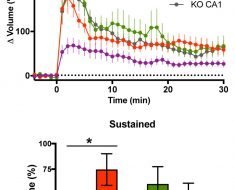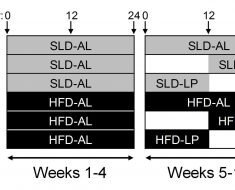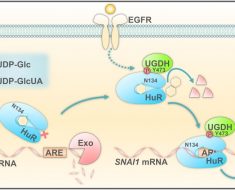In an international Phase II trial led by researchers at The University of Texas MD Anderson Cancer Center, treatment with the oral FGFR inhibitor erdafitinib (ERDA) was well-tolerated and achieved a robust response for patients with metastatic urothelial, or urinary tract, cancers harboring mutations in the FGFR3 gene.
The targeted therapy also appeared effective in a subset of patients for whom immunotherapy had previously failed, suggesting ERDA may provide benefit for patients without further treatment options. The results, presented today at the 2018 American Society of Clinical Oncology Annual Meeting by principal investigator Arlene Siefker-Radtke, M.D., professor of Genitourinary Medical Oncology, also were granted the “Best of ASCO” designation.
“Given the limited treatment options for urothelial cancer, we still have a long way to go to benefit our patients. Having a therapy with a response rate around 40 percent, with the convenience of being an oral medication, certainly fits an unmet need,” said Siefker-Radtke.
Urothelial cancers, which account for the vast majority of bladder cancers, arise in the urothelial cells that line the inside of the bladder, ureter and urethra. According to the American Cancer Society, more than 81,000 cases of bladder cancer are expected to be diagnosed in the U.S. this year, with more than 17,000 deaths from the disease.
For several decades, standard of care for urothelial cancers has been chemotherapy with a cisplatin-based regimen, but five new checkpoint blockade inhibitors have been approved in recent years, explained Siefker-Radtke. However, the overall response (OR) rate, defined as percentage of patients with tumor shrinkage, is just 15 to 20 percent with these immunotherapies, she said.
Erdafitinib is an oral medication that blocks activity of all FGFR proteins, including FGFR3. Genetic alterations in FGFR3 can be found in approximately 15 to 20 percent of patients with metastatic bladder cancer and are thought to drive development of the disease. Further, tumors with FGFR3 mutations do not appear to display signs of immune activation, and there is growing evidence suggesting these tumors may not respond as well to immunotherapy, explained Siefker-Radtke.
For the international, open-label, Phase II trial, 99 patients were enrolled and treated with a median of five cycles of the optimized ERDA regimen, consisting of 8 mg daily for 28 days, with escalation to 9 mg allowed in the absence of significant adverse events. All patients had metastatic or surgically unresectable urothelial cancer with a verified mutation in FGFR3 or fusion in FGFR2 or FGFR3. Previous treatment with chemotherapy and/or immune checkpoint inhibitors was allowed.
Treatment-related adverse events were manageable, with just 10 percent of patients discontinuing treatment due to symptoms. There were no treatment-related deaths and no Grade 4 events. The most common adverse events were Grade 1 and 2, including hyperphosphatemia (high blood phosphate levels) (72 patients, Grade ?3 in 2 patients), stomatitis (inflammation of the mouth and lips) (54 patients, Grade ? 3 in 9 patients), and diarrhea (37 patients, Grade ? 3 in 4 patients).
“ERDA treatment has been very tolerable. There have been few dose reductions, and most patients have been able to continue on treatment,” said Siefker-Radtke. “Even with evidence of high phosphate levels or other toxicities, usually a period of just holding the drug was enough to reduce symptoms.”
Treatment with ERDA met the primary objective with a 40 percent OR rate, including complete response, or tumor disappearance, in three percent of patients and partial response, or tumor shrinkage, in 37 percent. An additional 39 percent of patients had stable disease without progression. Preliminary data from the trial indicate a median overall survival of 13.8 months.
Among 22 patients who previously had been treated with checkpoint blockade inhibitors, ERDA treatment yielded an OR in 59 percent of patients.
“We will need confirmation in future studies, but there may be more benefit from an FGFR-targeted therapy in patients with an FGFR alteration as compared to immunotherapy,” said Siefker-Radtke. “It’s an exciting time, as we are heading into the field of personalized therapy for urothelial cancer.”
Source: Read Full Article





